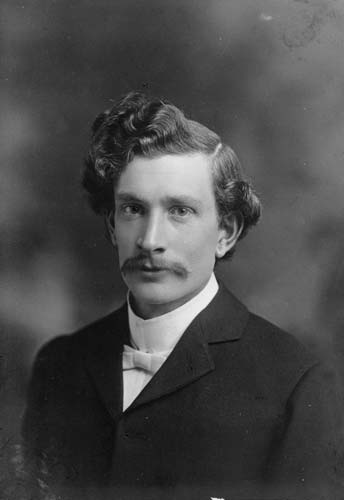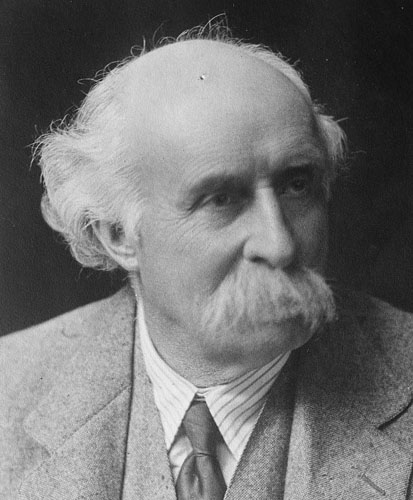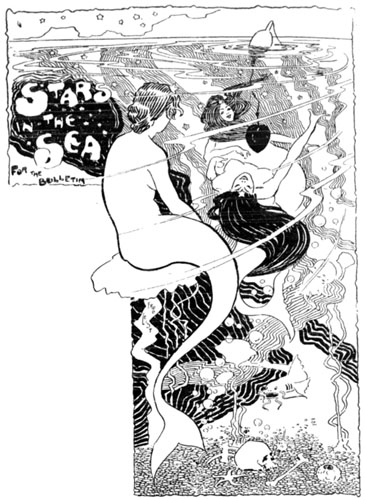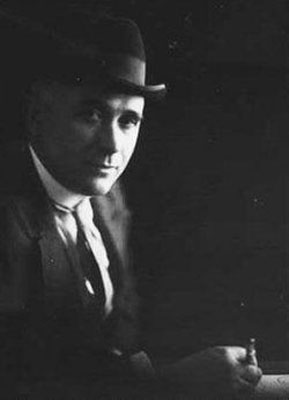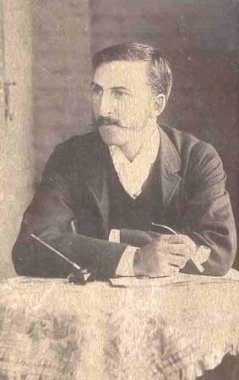There was movement at the station, for the word had passed around
That the colt from old Regret had got away,
And had joined the wild bush horses - he was worth a thousand pound,
So all the cracks had gathered to the fray.
All the tried and noted riders from the stations near and far
Had mustered at the homestead overnight,
For the bushmen love hard riding where the wild bush horses are,
And the stockhorse snuffs the battle with delight.
There was Harrison, who made his pile when Pardon won the cup,
The old man with his hair as white as snow;
But few could ride beside him when his blood was fairly up -
He would go wherever horse and man could go.
And Clancy of the Overflow came down to lend a hand,
No better horseman ever held the reins;
For never horse could throw him while the saddle girths would stand,
He learnt to ride while droving on the plains.
And one was there, a stripling on a small and weedy beast,
He was something like a racehorse undersized,
With a touch of Timor pony - three parts thoroughbred at least -
And such as are by mountain horsemen prized.
He was hard and tough and wiry - just the sort that won't say die -
There was courage in his quick impatient tread;
And he bore the badge of gameness in his bright and fiery eye,
And the proud and lofty carriage of his head.
But still so slight and weedy, one would doubt his power to stay,
And the old man said, "That horse will never do
For a long a tiring gallop - lad, you'd better stop away,
Those hills are far too rough for such as you."
So he waited sad and wistful - only Clancy stood his friend -
"I think we ought to let him come," he said;
"I warrant he'll be with us when he's wanted at the end,
For both his horse and he are mountain bred.
"He hails from Snowy River, up by Kosciusko's side,
Where the hills are twice as steep and twice as rough,
Where a horse's hoofs strike firelight from the flint stones every stride,
The man that holds his own is good enough.
And the Snowy River riders on the mountains make their home,
Where the river runs those giant hills between;
I have seen full many horsemen since I first commenced to roam,
But nowhere yet such horsemen have I seen."
So he went - they found the horses by the big mimosa clump -
They raced away towards the mountain's brow,
And the old man gave his orders, "Boys, go at them from the jump,
No use to try for fancy riding now.
And, Clancy, you must wheel them, try and wheel them to the right.
Ride boldly, lad, and never fear the spills,
For never yet was rider that could keep the mob in sight,
If once they gain the shelter of those hills."
So Clancy rode to wheel them - he was racing on the wing
Where the best and boldest riders take their place,
And he raced his stockhorse past them, and he made the ranges ring
With the stockwhip, as he met them face to face.
Then they halted for a moment, while he swung the dreaded lash,
But they saw their well-loved mountain full in view,
And they charged beneath the stockwhip with a sharp and sudden dash,
And off into the mountain scrub they flew.
Then fast the horsemen followed, where the gorges deep and black
Resounded to the thunder of their tread,
And the stockwhips woke the echoes, and they fiercely answered back
From cliffs and crags that beetled overhead.
And upward, ever upward, the wild horses held their way,
Where mountain ash and kurrajong grew wide;
And the old man muttered fiercely, "We may bid the mob good day,
No man can hold them down the other side."
When they reached the mountain's summit, even Clancy took a pull,
It well might make the boldest hold their breath,
The wild hop scrub grew thickly, and the hidden ground was full
Of wombat holes, and any slip was death.
But the man from Snowy River let the pony have his head,
And he swung his stockwhip round and gave a cheer,
And he raced him down the mountain like a torrent down its bed,
While the others stood and watched in very fear.
He sent the flint stones flying, but the pony kept his feet,
He cleared the fallen timber in his stride,
And the man from Snowy River never shifted in his seat -
It was grand to see that mountain horseman ride.
Through the stringybarks and saplings, on the rough and broken ground,
Down the hillside at a racing pace he went;
And he never drew the bridle till he landed safe and sound,
At the bottom of that terrible descent.
He was right among the horses as they climbed the further hill,
And the watchers on the mountain standing mute,
Saw him ply the stockwhip fiercely, he was right among them still,
As he raced across the clearing in pursuit.
Then they lost him for a moment, where two mountain gullies met
In the ranges, but a final glimpse reveals
On a dim and distant hillside the wild horses racing yet,
With the man from Snowy River at their heels.
And he ran them single-handed till their sides were white with foam.
He followed like a bloodhound on their track,
Till they halted cowed and beaten, then he turned their heads for home,
And alone and unassisted brought them back.
But his hardy mountain pony he could scarcely raise a trot,
He was blood from hip to shoulder from the spur;
But his pluck was still undaunted, and his courage fiery hot,
For never yet was mountain horse a cur.
And down by Kosciusko, where the pine-clad ridges raise
Their torn and rugged battlements on high,
Where the air is clear as crystal, and the white stars fairly blaze
At midnight in the cold and frosty sky,
And where around The Overflow the reed beds sweep and sway
To the breezes, and the rolling plains are wide,
The man from Snowy River is a household word today,
And the stockmen tell the story of his ride.
First published in
The Bulletin, 26 April 1890, and in the same magazine on 1 February 1950 an 29 January 1980;
and later in
The Man From Snowy River and Other Verses by A.B. Paterson, 1895;
Selections from the Australian Poets edited by Bertram Stevens, 1925;
Favourite Australian Poems edited by Ian Mudie, 1963;
From the Ballads to Brennan edited by T. Inglis Moore, 1964;
Banjo Paterson's Horses: The Man from Snowy Rover, Father Riley's Horse, Story of Mongrel Grey by A.B. Paterson, 1970;
The Penguin Book of Australian Poetry edited by Harry Heseltine, 1972;
Australia Poems in Perspective: A Collection of Poems and Critical Commentaries edited by P.K. Elkin, 1978;
The Collins Book of Australian Poetry compiled by Rodney Hall, 1981;
The Collected Verse of A.B. Paterson by A.B. Paterson, 1982;
A Treasury of Colonial Poetry, 1982;
Singer of the Bush, A.B. (Banjo) Paterson: Complete Works 1885-1900 compiled by Rosamund Campbell and Philippa Harvie, 1983;
Cross-Country: A Book of Australian Verse edited by John Barnes and Brian McFarlane, 1984;
The Illustrated Treasury of Australian Verse compiled by Beatrice Davis, 1984;
My Country: Australian Poetry and Short Stories, Two Hundred Years edited by Leonie Kramer, 1985;
The Banjo's Best-Loved Poems edited by Rosamund Campbell and Philippa Harvie, 1989;
A Collection of Australian Bush Verse, 1989;
A Vision Splendid: The Complete Poetry of A.B. 'Banjo' Paterson by A.B. Paterson, 1990;
A Treasury of Bush Verse edited by G. A. Wilkes, 1991;
A.B. 'Banjo' Paterson: Bush Ballads, Poems, Stories and Journalism edited by Clement Semmler, 1992;
Selected Poems: A. B. Paterson compiled by Les Murray, 1992;
The Advertiser, 27 January 1992;
The Collected Verse of Banjo Paterson edited by Clement Semmler, 1993;
Banjo Paterson: His Poetry and Prose compiled by Richard Hall, 1993;
The Penguin Book of Australian Ballads edited by Elizabeth Webby and Philip Butterss, 1993;
The Age, 16 October 1995;
The Australian, 17 October 1995;
An Anthology of Australian Literature edited by Ch'oe Chin-yong and Cynthia Van Den Driessen, 1995;
The Illustrated Treasury of Australian Verse compiled by Beatrice Davis, 1996;
The Arnold Anthology of Post-Colonial Literatures in English edited by John Thieme, 1996;
Australian Verse: An Oxford Anthology edited by John Leonard, 1998;
Our Country: Classic Australian Poetry: From the Colonial Ballads to Paterson & Lawson edited by Michael Cook, 2004;
Two Centuries of Australian Poetry edited by Kathrine Bell, 2007;
The Bush Poems of A. B.(Banjo) Paterson by A.B.Paterson, 2008;
The Book of Australian Popular Rhymed Verse: A Classic Collection of Entertaining and Recitable Poems and Verse: From Henry Lawson to Barry Humphries edited by Jim Haynes, 2008;
Macquarie PEN Anthology of Australian Literature edited by Nicholas Jose, Kerryn Goldsworthy, Anita Heiss, David McCooey, Peter Minter, Nicole Moore and Elizabeth Webby, 2009; and
The Puncher & Wattmann Anthology of Australian Poetry edited by John Leonard, 2009.
Author reference sites: Austlit,
Australian Dictionary of Biography,
Australian Poetry LibrarySee
also.
